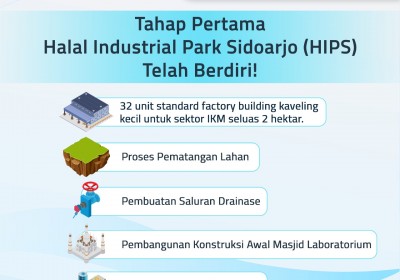Halal Industrial Estate (KIH) Development Crucial In Fulfilling Syariah Economy Masterplan
October 21, 2021
JAKARTA – As one of the main strategies to help Indonesia become a leading global producer of halal products by 2024, the government has approved the establishment of Halal Industrial Estates (KIH) across the country.
The Industry Ministry (Kemenperin), together with the Halal Certification Agency (BPJPH) and the Indonesian Ulema Council (MUI), have established three KIHs, namely the Modern Halal Valley in Banten, the Halal Industrial Park in Sidoarjo and the Bintan Inti Halal Hub.
“The presence of the 148-hectare KIH in Sidoarjo, which is equipped with facilities and infrastructure to support halal product production, is expected to strengthen the entire halal value chain from the upstream to downstream sectors in order to develop the potential of halal products in Indonesia, especially in East Java in meeting the needs of the domestic and global market,” Industry Minister (Menperin) Agus Gumiwang Kartasasmita said in an official statement on Friday (1/10).
Minister Agus said that the considerable potential in the halal industry must be supported by collaborative programs of ministries and institutions in the region in order to strengthen the halal industry ecosystem. The availability of complete and integrated facilities and infrastructure will increase investment interest in KIHs and make it more competitive with neighbouring countries.
The government must continue to make efforts to encourage the development of KIHs and halal hubs in the country, especially in regional areas, in order to form a strong and equitable halal industry ecosystem. This can be realized through cooperation and support with other, related parties.
“The development of KIHs is not only limited to being about obtaining permits but also how to bring tenants into it. Many aspects of KIH development needs specific attention, such as how to facilitate incentives, in order to strengthen the halal value chain ecosystem from global halal industry activities,” Minister Agus said.
For example, in the first phase of the Sidoarjo Halal Industrial Park (HIPS), 32 standard factory buildings have already been constructed to house small-to-medium industries (IKM) that have applied as tenants. The total size of the area comprises of two hectares. Additionally, the park operators have carried out the process of land preparation and construction of drainage channels along environmental roads, mosques, laboratories and the HIPS management offices.
“After seeing the very fast progress of KIH development, the government will accelerate the strengthening of the KIH ecosystem by compiling incentive plans in the form of stipulations and fiscal measures such as relaxing value added tax (VAT) regulation for industrial plots, which has been applied to the properties,” added the Minister.
Currently, the government is revising the provisions regarding the procedure for obtaining a certificate in the context of establishing KIHs, which will be changed into the determination of a halal industrial area by the Minister by facilitating the provision of facilities and incentives for halal businesses and producers.
Indonesia’s Research Institutions Supporting the Development of the Electric Vehicle Industry
Indonesian Muslim Fashion and Cosmetics IKMs Shine at Dubai World Expo 2020
Govt Steps Up UMKM Transformation Efforts in the Midst of Pandemic Slowdown
Govt Encourages Promotion of IKM Products in Digital Era
Government Begins Developing Maritime Training Center in Makassar
Tweets by IDDevForum
